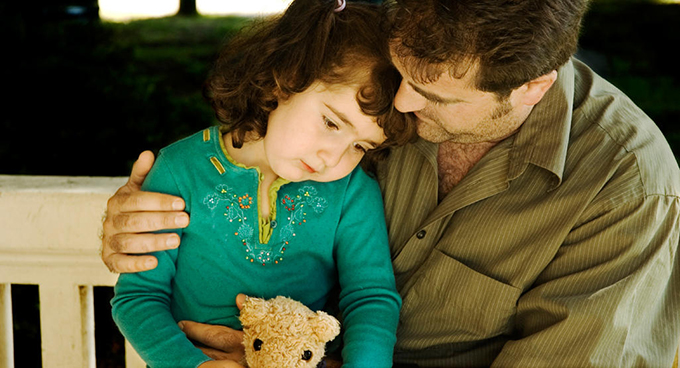
Although some children have the chance to cross their parents’ separation without suffering too much, most of them may be disrupted in the short term , if not over a longer period .
As an adult, you probably have probably forgotten how important your family was to your stability and even to your identity. Children have not yet developed autonomy, independence or sense of security; on the contrary, their entire frame of reference rests on the family. When this frame breaks, they may feel like their world is falling apart.
It should be noted that the suggestions I am making here relate to the (relatively) friendly separations, where both parents have in mind the best interests of the child. These tips will be of little value in the case of conflicting separations, where one or both parents seek to destroy the other.
With toddlers
Very young children (under 5 years old) have a limited understanding of human relationships. What they will notice is that Dad leaves and does not come back for a long time (the days go by more slowly in the eyes of a 5 year old), or they have to live between two houses. The main problem here will be to overcome the anxiety of separation.
Explain the situation in the simplest possible terms: “Mom and Dad live in two different houses now. One week you’ll live with mom, the other with dad, but you’ll be able to call each of us every day, and you’ll have your things in both houses. ” The consistency of rules and expectations between the two houses should provide a sense of stability and familiarity.
With children
Children who are old enough to go to primary school are extremely egocentric and may believe that they are responsible for what happens in the negative (eg “I did not clean my room so Mom left me”) . As irrational as it may seem to an adult, this way of thinking is completely normal at this age.
Take the lead by explaining very clearly to the child that your separation has nothing to do with him and that you will always be there for him. Tell her something like “Mom and dad can not live together anymore because it’s hard for some people to stay friends when they get older.”
With teenagers
Children and adolescents may tend to see things in a black and white manner, and thus push each parent to play the right or wrong role – this can be difficult to overcome and take time to resolve.
Even if you have to avoid involving children, whatever their age, in the specific reasons of your divorce, it can be more complicated with teenagers when there is a visible reason (excessive alcohol consumption, mental problems irresponsible financial decisions, known infidelity).
In this case, the best you can do is to avoid demonizing the other parent and suggest to the older ones to discuss directly with the parent concerned worries they have about their attitude. There is no point dodging questions with ineffective platitudes like “You’ll understand when you’re older.” Do not go into the details of your adult conflicts but answer any questions they may have about you, your conduct and your future plans.
Always remember that if you start to denigrate the other parent, you are actually criticizing 50% of your child’s DNA and asking them to choose between two people they like. This will only serve to cause further harmto your children.
Older teens may have strong views about how their lifestyle is organized and may not be willing to politely comply with shared custody models or even family court orders. Listen to their concerns (which are most likely directed to their friends, sports or school activities), be understanding and be flexible. You and your ex are turning their lives upside down, which can lead to their anger, so get ready to compromise.
Take time
Whatever their age, try to be consistent in your co-parent role and take personal responsibility for keeping your promises.
Avoid getting other “disruptive” elements on the scene. It can take months, if not years, for children to feel good about this new family organization. Introducing it shortly after a new boyfriend or girlfriend, or completely changing one’s lifestyle, would not be very delicate.
Understand that your desire to move forward and reinvent yourself may not be appreciated by children who need time to mourn family harmony and adapt to your – and their – new situation.
Author Bio: Rachael Sharman is a Senior Lecturer in Psychology at the University of the Sunshine Coast
